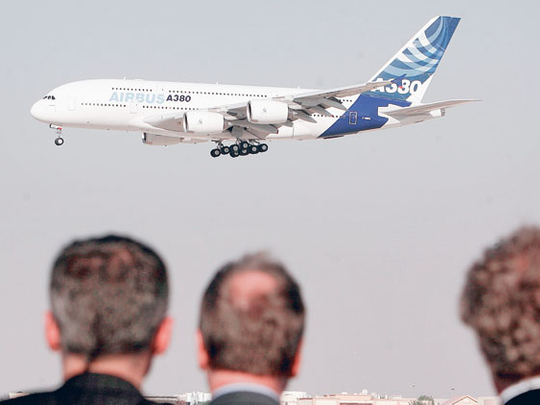
Toulouse: Airbus is watching profits swell with every step of the euro's decline.
Each 10 cent drop in the currency adds 1 billion euros ($1.26 billion, Dh4.6 billion) to operating profit at Airbus, according to Chief Operating Officer John Leahy. As Greece's fiscal crisis leaves politicians scrambling to halt the slump in confidence in the euro, European executives are totting up the gains. Two years ago, the currency shot to an all-time high of $1.60 as the US economy sank into recession, squeezing margins on European goods sold overseas.
"Because of massive growth in markets like the US and China, we have a strongly growing currency exposure," Daimler Chief Executive Officer Dieter Zetsche said in an interview in Stuttgart. "The fall of the euro is a benefit."
The 16-nation currency has dropped 13 per cent since the start of the year and traded close to a four-year low of $1.2509 in New York on Thursday. A 10 per cent decline in the euro boosts profit at companies in the region by an average of 3 percentage points, estimates Stefan Hofrichter, chief economist at Allianz Global Investor's RCM unit in Frankfurt.
Eyeing orders
Toulouse, France-based Airbus, which sells commercial aircraft in dollars, is hoping to snare extra orders after the surge in the euro in 2008 handed US rival Boeing a pricing advantage. Chicago-based Boeing pays virtually all its costs in dollars, while Airbus has half its costs in euros.
Bayerische Motoren Werke (BMW), the world's largest luxury carmaker, which gets almost a quarter of its revenue in North America, anticipates a "double-digit" million-euro gain in operating profit as the fall against the dollar more than offsets other currency shifts, spokesman Marc Hassinger said.
"My concern is that the benefits will at most compensate for the headwind stemming from fiscal tightening, a more restrictive Chinese monetary policy and weakening growth momentum," said Allianz's Hofrichter.
Caught by surprise at the extent of Greece's fiscal woes and ensuing slump in the euro, many European companies are still locked into unfavourable hedging contracts and won't feel the full benefits of the recent decrease until 2011 or 2012.
PPR, owner of the Gucci luxury brand and Conforama furniture stores, will be negatively affected by its hedging policy, which runs through May 2011, Chief Executive Officer Francois-Henri Pinault said at the company's annual meeting in Paris on Wednesday.
Even so, the decline in the value of the euro will be "more than" compensated by earnings in other currencies in 2010, Pinault said.
That's not true for all industries. For steelmakers, the rising dollar poses "a problem" by making raw materials more expensive, said Gisbert Ruehl, CEO of Duisburg, Germany's steel trader Kloeckner & Co.
Sporting-goods maker Puma pays in dollars for about 95 per cent of its soccer shoes and jerseys, meaning buying costs rise when the euro weakens, spokeswoman Kerstin Neuber said. The same goes for retailer Hennes & Mauritz, which buys the majority of merchandise in dollars.
The euro has fallen as low as $0.8272 and risen as high as $1.6038 since it was introduced 10 years ago. The currency's value is still higher than the weekly average rate of $1.1833 over the decade.
That makes the current level "normal," say executives at companies including Airbus, Daimler and Royal Philips Electronics, the Dutch maker of patient-monitoring systems. "Everybody is talking about the weak euro," said Philips CEO Gerard Kleisterlee. "A level of $1.20 is the level we had three years ago. So from that perspective, I don't see the big deal."
Given the swings in the common currency, European companies are seeking ways to give greater protection than hedging. Daimler decided last December to shift some production of its Mercedes-Benz C-Class to the US, Zetsche said.
BMW wants to reduce about 6 billion euros in foreign currency exposure by pursuing contracts with suppliers that allow the manufacturer to pay for components in different currencies, Herbert Diess, BMW's purchasing chief, said in an interview.
"We will continue with the multi-currency orders because we're looking at the long term," Diess said. "The euro could be down today, but it could also be up again tomorrow."












